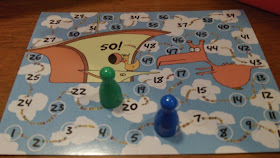 Cartoona (and expansions)
Cartoona (and expansions)Designed by Robert Burke
Published by Robert Burke Games
and by Game Salute
1 to 8 Players
30 Minutes
A set-collecting-tile-laying-creature-creating game for ages 3 and up
Background/Introduction
One of my absolute favorite games is Carcassonne, which just happens to be a tile laying game as well. Cartoona caught my eye because of the interesting cartoonish artwork and the fact that it was a tile laying game. The artwork is pretty simplistic, but it is fun and it really reminds me of the early Simpson episodes. I really think this game shines with its ability to work well with a very large age range. My daughter who is between 2 and 3 loves just playing with the tiles and sorting them according to their color. The game tiles are very thick and good quality, so I'm not worried about my daughter bending them or ruining them very easily. The game is very simple in nature and is a light family game. The instruction book comes with some great different ways to adjust the game for the younger age groups or just provide fun variation. There is an expansion pack that you can get with a few more tiles and cards, and this just really adds to the giant box of stuff. You will notice right off that the game box is fairly large and that isn't just extra room for expansions, it is there to fit all 94 creature tiles (don't worry, the expansion materials all fit in here too), 70 action cards, 8 player screens, a scoring track with pawns, and the rule book.
Components/Rule Book
As I just stated above in the background above, the game is chalk full of good quality components and in a game where the tiles really make up the game, I'm very glad that the tiles are top notch. Great colors and fun artwork with very thick and sturdy tiles, will make this game last a long time and makes me feel more comfortable letting the younger children play the game. The scoring card or track that came with the game feels more like a heavy paper however and I would have liked to see a fun scoring card made out of similar material as the creature tiles. The cards are good quality and the instruction book is very nice (again, with the different variants that you can play) and includes illustrations.
Gameplay and Thoughts
The basic idea for the complete game is that you have a certain hand or pool of creature tiles that you can use to build and create different creatures. The creature tiles are split up into certain body parts (front legs, rear legs, tail, neck, head, ears, mouth) and you can create creatures by matching up these tiles appropriately. You will score points for your completed creature and you will be able to start another creature. There are points on each tile that you play and each of the tiles have a different color (some are split into two colors providing an option - a mini wild card if you will). If your creature is made up of all the same color, you get double the points! This seemed more challenging to me than I originally thought it would be, but it is a nice reward for being picky on your tiles and tile placement. I found myself too many times not being able to complete a creature in one color and just settling for normal points by adding a yellow tile to my otherwise purple creature. Drawing and adding tiles - pretty straight forward right?
Well, you can play a variant with just the tiles, but the cards included in the game add a needed element in my opinion to the game. With the younger kids, tiles alone will be great, but if you are playing with older kids and adults I highly recommend the cards. When playing with the cards, players also are able to draw cards and play cards in addition to creature tiles. These cards can give bonuses, block other actions, change tile scoring, swap tiles, and much more. This adds some fun and gives the game some player interaction.
The game isn't Carcassonne or wont feel like other euro style strategic games, but the game is a fun light family game. I am impressed with the different variations given in the rule book and how the game can be played with such a young age group. That is probably my favorite thing about the entire game is that I feel like my kids can enjoy this at a really young age and it can continue to evolve for them as needed. Again, the quality of the tiles is just fantastic and there are a lot of them. I recommend this game for those looking for a family game that can work well with a really young age group. It can be fun with the cards added for an older group, but may still be too light for some more strategic gamers. I give Cartoona and its expansions a 2 Fingers Up or 7/10 Stars for being one of the few family games that can reach such a young generation and that is How Lou Sees It!
A big SHOUT OUT to Game Salute and Robert Burke Games for providing this review copy and making this review possible.



















